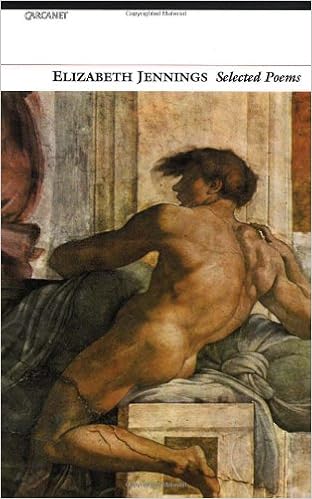
English poet Elizabeth Jennings (1926-2001) has maintained a reputation that is solid but not nearly as great as it should be. As a traditionalist who typically writes in strict forms, she is sometimes grouped with Philip Larkin (like him, she was a librarian) or Thom Gunn, though to me her clean language, precision, and perfect fusion of the emotional and the intellectual are closer to Robert Graves. But comparisons may obscure the uniqueness of her achievement in creating a body of work which is at once wholly modern and wholly traditional. Readers looking for poetry which is modernistic but accessible will be glad to have found her, and poets can learn much from almost every aspect of her practice: the success with which she masters strict rhymed forms so easily that you might not notice the rhymes and stanzas if you were hearing the poem read aloud for the first time, the subtlety of her full and slant rhyming techniques, and her ability to make a last line a "swerve" which gives the whole poem a new context, without, in the manner of many poets who do this, being too obviously clever about it. She is a poet of both feelings and thoughts, whose verse submits both to a remarkable precision: a poem like "For a child born dead" can move to tears not so much by the intensity of its emotion as by the intensity of the discipline with which it is expressed. Her Catholicism influences much of her work, sometimes explicitly but often indirectly, yet this poetry is certainly not only for religious readers: her devotional poems, like those of Donne, can be appreciated whatever your personal religious beliefs. In short, this is poetry of a very high order. Jennings's extant work is very extensive, as shown by the fact that her recently published Elizabeth Jennings: New Collected Poems (Poetry Pleiade) runs to nearly 500 pages and the also recently published comprehensive The Collected Poems to over a thousand. I haven't seen those books, but reviews I've read have suggested that Jennings's work as a whole is uneven, with much of it clearly not up to her best, so on that basis I suspect that most readers should content themselves with this Selected, in which the average quality is extremely high. Strongly recommended to everyone, especially those who have all but given up on most contemporary poetry as being emotionally lackluster, fustily academic, prosaically pedestrian, and perversely obscure.
Elizabeth Jennings was born in Boston, Lincolnshire in 1926, and lived most of her life in Oxford, where she moved in 1932. She was educated at Rye St Antony and Oxford High School before reading English at St Anne's College, Oxford, where she began a B.Litt., but left to pursue a career in copy-editing in London. Returning to Oxford to take up a full-time post as a librarian at the city library, Jennings worked briefly at Chatto and Windus before becoming a full-time poet. Her second volume of poetry, A Way of Looking (1955), won the Somerset Maugham Award, which allowed her to travel to Rome, a city which had an immense impact on her poetry and Roman Catholic faith. While she suffered from physical and mental ill health from her early thirties, Jennings was a popular and widely read poet. She received the W.H. Smith award in 1987 for Collected Poems 1953 - 1985, and in 1992 was awarded a CBE. She died in Rosebank Care Home, Bampton, in 2001 and is buried in Wolvercote Cemetery, Oxford.
No comments:
Post a Comment